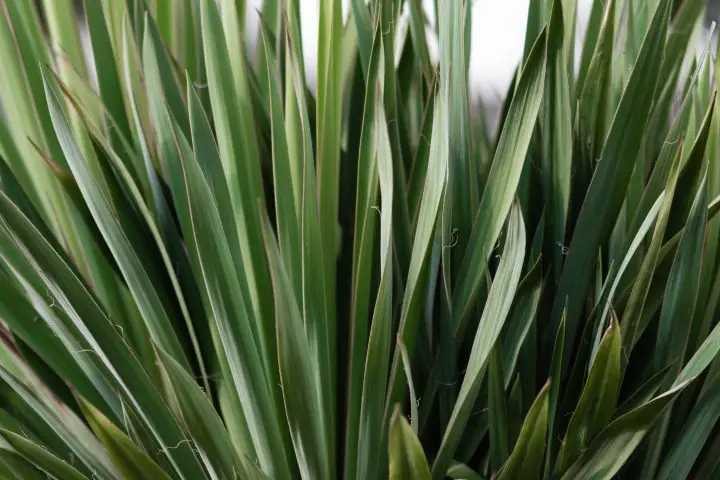When your dog develops arthritis from old age, you might start looking around for natural remedies and come across yucca. Often considered a natural alternative to steroidal medications, yucca is seen as a supplement for dogs. At the same time, it’s called highly toxic by the ASPCA and veterinarians. So can dogs eat yucca or not? Should you be concerned if your dog snags a bite of yucca fries from your plate?
There are a number of things to consider when it comes to giving a dog yucca, so let’s begin.

What is Yucca?
Yucca is seen throughout the dry, arid regions of the world. You can find swaths of yucca in Mexican deserts and throughout the Southwest of the US. Throughout history, yucca has been regarded as an edible delicacy among many peoples, as well as a medicine.
For humans, yucca root comes with many benefits, including vitamins A, C, and B, as well as potassium, zinc, iron, magnesium, copper, and selenium. Powdered yucca root is also used in health supplements and added to tea. Some cosmetics contain yucca to clear up skin conditions, as yucca also contains anti-inflammatory properties.
However, dogs and other animals can’t get the same benefit people do. Why? Because yucca is also toxic to dogs in higher doses. Fortunately, yucca is bitter enough to keep dogs from eating it; but there are cases where a dog might chew on a plant.
Different Types of Yucca Plant
There are many kinds of yucca, each of them a part of the Asparagaceae family. Each kind of yucca is toxic to dogs, cats, and even larger grazing animals, like horses.
Species of yucca include:
- Banana Yucca (Yucca baccata)
- Buckley’s Yucca (Yucca constricta)
- Spanish Bayonet (Yucca aloifolia)
- Adam’s Needle (Yucca filamentosa)
- Our Lord’s Candle (Yucca whipplei)
- Soapweed Yucca (Yucca glauca)
- Beargrass Yucca (Yucca smalliana)
- Beaked Yucca (Yucca rostrata)
- Mojave Yucca (Yucca shidigera)
- Spanish Dagger (Yucca gloriosa)
- and many more
While many types of yucca are grown outdoors for ornamentation around the yard, you can also grow several varieties inside. Growing yucca indoors is easier than you might think; and you might think it’s a great idea until you remember you have dogs and cats.
Can Dogs Eat Yucca?
No, dogs can’t eat yucca root. The ASPCA lists yucca as a toxic substance for dogs, cats, horses, and other grazing animals. Other sources will tell you that yucca is okay for dogs and cats as a supplement—but they sometimes forget to say that it must be commercially processed first. Raw yucca, including the fruits, flowers, stems, leaves, and roots, is toxic to animals.
Why is raw yucca bad for dogs? Yucca contains a compound called steroidal saponin, which causes adverse reactions in dogs and cats. Should a dog ingest a small amount of raw yucca, they will soon start vomiting and have severe diarrhea.
Raw yucca also contains trace amounts of cyanide. The amounts of cyanide have little effect on humans. For our small companions, though, the levels of cyanide are poisonous. Eating too much yucca could be lethal; and despite the bitter taste, dogs will try it anyway.
Can Dogs Eat Cooked Yucca?
Some people say that cooking yucca root diminishes the toxicity for animals. This isn’t true. They have only cooked off the cyanide, but the steroidal saponins remain. Yucca, raw or cooked, isn’t safe for dogs. No matter how you serve up a plate of yucca, there are still harmful compounds in it.
The only exception is when you are using a refined yucca supplement.
How Bad is Yucca For Dogs?
You may be wondering just how bad yucca poisoning can be for dogs. Just know that it can get very bad. The steroidal saponins in yucca irritate the intestines and central nervous system. When a large enough amount is eaten, yucca poisoning can be fatal. There is some good news, though. Because yucca tastes foul to dogs and causes an immediate reaction, they usually don’t eat enough raw yucca for it to be lethal.
The short video below outlines yucca poisoning, as well as prevention methods:
Signs of Yucca Poisoning in Dogs
If your four-legged pal has eaten yucca, you may notice the following symptoms:
- Abdominal pain
- Loss of appetite
- Diarrhea
- Dilated pupils
- Depression
- Bloating
- Increased heart rate
- Excessive drooling
- Stomach irritation
- Muscle weakness
- Loss of coordination and muscle control
- Vomiting
- Difficulty walking
- Liver disease
- Photosensitivity
Should you notice any of these signs in your dog or have seen them eat yucca, don’t wait. Call a veterinarian immediately or the Pet Poison Helpline for assistance. If possible, try to figure out what kind of yucca plant your dog ate, as this could help with diagnosis and treatment.
Diagnosing and Treating Yucca Poisoning in Dogs
Once your dog has taken a nibble of yucca, there is no time to waste. You have 18 hours before your dog develops renal symptoms. Call the vet, hop in the car with your furry friend, and get a physical examination done. The veterinarian will perform a full examination, checking your dog’s heart and respiratory rate, reflexes, and oxygen levels. Discuss any unusual behavior you may have noticed, as this only helps with diagnosis.
Laboratory tests may also be ordered. These often include urinalysis, complete blood count (CBC), electrolytes, glucose, and blood urea nitrogen (BUN) tests. Should your dog be vomiting often, they may also conduct a packed cell volume (PCV) test. Other tests and procedures, like endoscopy, may be required, especially if any yucca is caught in your dog’s throat.
Once the veterinarian comes up with a diagnosis, treatment begins. Vomiting may be induced with activated charcoal or hydrogen peroxide medicine. To flush out toxins, your dog may be placed on IV. Emptying the stomach generally requires gastric lavage.
Once all this is done, your dog should recover without any problems.

When is Yucca Good For Dogs?
In small doses yucca has some benefits. While it sounds contradictory, a tiny serving of yucca can relieve digestive issues, arthritis, and skin conditions that affect your dog. Let’s place emphasis on “tiny serving.”
Some dog food manufacturers even add yucca in to help diminish the scent of excrement. If your dog’s poo is heinous, you can buy food with yucca in it to dull the fumes a bit.
But why are these yucca supplements okay? Can dogs eat yucca or not?
Raw yucca or cooked yucca is never safe. Yucca is only safe when it has been commercially produced, refined, and diluted. Medicinal yucca capsules then have benefits for your dog to enjoy. Otherwise, avoid it entirely.
Just to be safe, you might want to avoid anything with yucca in it. If you’re unsure, speak to your veterinarian about yucca supplements and see what they say.
The Yucky Side of Yucca
Can dogs eat yucca? Humans love yucca and all its purported health benefits. Unfortunately, the same can’t be said for our canine friends. While yucca supplements may help your dog with joint pain, digestive problems, and skin conditions, raw and cooked yucca is 100% unsafe. Even in small doses, raw yucca can cause vomiting and diarrhea. Higher doses may lead to death. Therefore, if you have yucca in the yard, you might want to relocate those plants elsewhere and keep your furry friend safe.
FAQs
Ingesting yucca plants can be harmful to dogs, as yucca plants contain compounds called saponins that can be toxic. The severity of the toxicity can vary depending on the species of yucca, the amount ingested, and the size of the dog.
If you’re considering using yucca as a supplement or ingredient in your dog’s diet, it’s important to consult with a veterinarian before doing so. While some yucca supplements are marketed for certain health benefits, it’s crucial to ensure that any supplement is safe and appropriate for your specific dog’s needs under the guidance of a veterinary professional.





